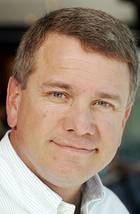Steady gains in the gaming and tourism industry have helped generate hope that the city has turned the corner in its economic recovery.
Wishful thinking? If so, it’s shared by a lot of smart and successful people. Here’s how they’re feeling about Las Vegas’ prospects for 2012.
-

Stephen Brown
Economics professor and director of the Center for Business and Economic Research at UNLV
I think we’re pretty much at bottom as far as construction is concerned. I’m looking for a little growth there in 2012, but not a lot — probably a little more on the commercial side than the residential side. The problem is we really have a big overhang of residential and commercial space, and it could take awhile to work through. I think we’re going to see depressed housing prices for a while. Eventually, the market will be underbuilt and prices will rise again. It really depends upon how soon the population begins growing. We have a lot of housing to absorb in Las Vegas.
Tourism is back up to where it was in 2007, but the tourists are coming from farther away. They’re not coming as much from California. They’re staying a little longer, hotel room rates are up but not up to 2007 levels, they’re not doing as much gaming. We’re actually seeing a decent recovery in tourism, and I expect that to continue in 2012. It’s going to be a little different tourist than we saw in 2007. It’s going to be like the tourists we saw in the 1990s. They just didn’t come with as much money to spend. We’re not going to see a return to (2006 and 2007) because it was based on expansive monetary policies and financial innovation gone wrong.
We’ve been down so long and so far that even a weak recovery doesn’t look great by historical standards for Las Vegas, but I expect this coming year the economy to be stronger. I expect continuing gains in visitor volume, gaming, which will grow at a faster rate in 2012 because the economy is a little stronger.
I think unemployment will remain high. The economy isn’t creating jobs very fast. One of the big concerns with that is you have a lot of people who have dropped out of the labor force. It’s going to be a long time before those people are put back to work.
Overall, I would say I’m optimistic about the coming year, but other people might view my optimism as continuing pessimism because it’s not the strong growth that Las Vegas was used to.
-

Michael Paladino
Gaming analyst and senior director at Fitch Ratings in New York
Fitch expects Las Vegas Strip visitation to grow roughly 2 percent, with slightly faster gaming revenue growth of around 5 percent.
In 2010 and 2011, Strip operators focused on maintaining visitation following the recession and digesting additional capacity from CityCenter and Cosmopolitan. However, in 2012 companies will increasingly focus on higher-yielding customers, which could constrain visitation but drive higher spend-per-visit, room rates and profitability.
It is apparent that the Las Vegas Strip is sensitive to macro-economic factors, so the outcome of the European debt crisis, the potential for a hard/soft landing in China and a slow growth environment in the United States can certainly affect visitation.
Companies with stronger financial positions, such as Wynn and Las Vegas Sands, have been able to solidly reinvest in their properties over the last few years, compared to financially weaker companies, such as MGM Resorts and Caesars. MGM’s financial profile has improved such that it is in a better position to reinvest capital into its Strip properties, such as the room remodel at the Bellagio. Caesars continues to focus capital decisions on new projects such as Octavius Tower and Project Linq, which is consistent with its strategy of trying to grow into its capital structure, rather than reducing debt and reinvesting substantially in its existing portfolio.
Major supply growth will remain constrained for some time, until the economy and capital markets are on stronger footing. Standard company-speak that major projects such as Echelon are three to five years away means that the decision-making environment is not yet ripe for movement on large-scale projects.
The best thing to say about the Las Vegas locals market is that the worst is likely over, but Fitch remains cautious on near-term growth prospects. Fitch is expecting roughly flat revenue growth next year, as the continued Strip recovery should serve as a stabilizing factor for the local economy.
-

Chris Powell
President and general manager, Las Vegas Motor Speedway
I don’t fancy myself a prognosticator of economic climate. I can only speak to our business here, but we have been buoyed here at this speedway by a couple of things. One is a bit of positive momentum that has begun in the NASCAR world. TV ratings and ticket sales were up a little bit in 2011, especially in the back half of 2011, so we’re optimistic that 2012 will be better than 2011 was.
Our NASCAR weekend is in March. Our ticket sales are up — not significantly, but they’re not down. So that’s a positive.
And then almost as impactful as the NASCAR industry is our nontraditional revenue. That is track rental business that we see growing — events like the Electric Daisy Carnival, which drew more than 230,000 people over the course of three nights and provided a tremendous boost to our economy in June.
We also have an uptick in the track rental business on the automotive industry side. For instance we had a big event here that Volkswagen did in 2011. They brought in dealers from across the world to introduce a new line.
So we have seen a bottoming out in our business. We’ve seen some bounceback.
We’re not back where we were in 2006 and ’07, but we’re not worse than we were in 2008 and 2010. In fact, we’re better than we were then.
I’d like to believe maybe the period of uncertainty has gone on for so long that maybe people are less uncertain in their spending. Maybe they feel a little bit more comfortable in spending the dollars that they were spending in the mid-2000s. They feel like, if they were able to keep their jobs during this downturn, they’re fairly safe now.
I don’t know if we’re in for a breakthrough in 2012. I’d like to believe I have a long time to go until I retire, but I don’t know that I’ll ever see things get back to where they were.
But I do feel better about things today than I did a year ago based on what we’re seeing here at our speedway.
I’m very much bullish on next year and the years hence.
-

Mike Mixer
Managing partner for the Colliers International Las Vegas office and executive managing director for Colliers International Hotels USA
For me, the biggest standout statistic we saw in 2011 — and one that will continue into 2012 — is visitor volume. We were on pace in 2011 to get close to our record high of 39 million visitors, which we set in 2007.
It shows that we’re a solid attraction; that the demand of Las Vegas is still there. The counter to that is our visitors are not spending as much money as they were in 2007.
But if we’re all in agreement that the economy is improving, in 2012 that should translate into a bigger spend per person who’s coming. And if they’re coming at record levels, then that money will result in a bigger bottom line for all the players in the hospitality arena.
The result of a higher visitor volume means we have higher occupancy. We’re at about 85 percent occupancy, and as that percentage stays higher our room rates are going to start to edge up. That’s a big plus for the companies that operate in this market. As those room rates start to increase, I think demand will be slightly affected, but it’s a good balance. It gives operators an opportunity to raise their room rates at a reasonable rate.
The entire hospitality industry is improving nationwide. There is demand growth, and that is in part due to there being minimal product built. We don’t expect to see much new inventory (in hotel rooms). That means that the average daily rates will start to improve as occupancy continues to improve.
I think we’ll also start to see renovation budgets get expanded. So we might start to see not new development, but renovation of existing development to bring it up to standards needed to stay competitive. We might see more and more dollars being spent on updating, which helps our local economy in terms of construction jobs.
-

Randy Fine
Casino marketer-turned-industry consultant, who founded the Fine Point Group in Las Vegas
The one thing we would guarantee, despite the supposed claims of the Mayans, is that the world isn’t going to end.
In 2012, we believe some things will get better, and some won’t. On the positive side, we will see continued incremental gains in Strip visitation and spending. But we must caution — while single-digit growth beats the alternative, we will need many years of consistent growth to return to the peaks of 2007. Happy days aren’t here again, yet. We have a long road ahead.
On the negative side, we don’t foresee meaningful improvement in our local economy. Local casino demand from 2003 to 2007 was driven by a boomtown mentality fueled by a false belief in wealth through housing appreciation. It never made sense, and it has left a large percentage of our friends and neighbors in personal financial crisis. Until that works itself through, anemia will be the order of the day.
There is an obvious solution to improve our local economy, and if I could wish for one thing in 2012, it would be for state, local, and private industry to focus on luring tax- and regulation-saturated Californian companies to Las Vegas. We have great air service for business travel, cheap housing, huge tax advantages and the best entertainment and restaurants in the world. Zappos is a great start, but we need to get them some company.
-

Mark Lipparelli
Chairman, State Gaming Control Board
Probably the biggest thing on our horizon is the completion of our interactive regulations and licensing. I would expect that we will see a number or existing licensees expanding their licensing status as well as several new entrants that probably will come into the state to take advantage of what we’ve created.
We’ve seen consecutive months of stabilization and some growth in gaming revenue and a more optimistic recovery on the non-gaming side with hotel rooms, food and beverage and the entertainment side making an even stronger comeback.
The booking windows have improved, so we’re hopeful of seeing continued signs of stability and maybe, if we’re lucky, some growth in 2012.
I think there’s a general trend among the consumer that there have been improvements overall. Whether we like it or not, I think we are inextricably linked to that consumer now that we’ve expanded the kinds of offerings that we have. Most of it’s driven by the modest improvement in the consumer activity and that the economy in general is improving a little at a time.
We’re seeing that as well. The job pictures are improving and the fears of a double-dip recession seem to be waning, so there’s a sense that, although fragile, we are seeing signs of improvement.
-

Richard “Skip” Bronson
Chairman of U.S. Digital Gaming and a former director of Mirage Resorts
The need for new and inventive revenue isn’t going away, nor is online gaming as a natural source. The Brookings Institution reports a projected nationwide deficit in state budgets of over $400 billion in 2012, which means more slashing, more tax hikes and more searchlights for alternative forms of revenue. Once again, states will be looking for the types of revenue that online gaming can bring — immediate, significant and safely regulated.
The number of states pursuing online gaming will double in 2012. Expect the number of Legislatures with active bills to be 10 or more. I’ll boldly predict that at least two or three will adopt it.
As this industry ramps up, expect the American companies to be the pioneers that settle the frontier. Most of the offshore interests don’t have the familiarity with U.S. government relations and licensing, and there has been a dark cloud over many of the names and players, who have a checkered history. It is a Tupperware-tight industry that will require the highest levels of compliance and conformity. There remains an opportunity for some of the clean European operators to enter the American market, but they will be few and they’ll need a star-spangled partner.
-

Jeffrey Rugg
Attorney and shareholder at the Las Vegas office of the law firm Brownstein Hyatt Farber Schreck
I fully expect to see continued litigation and bankruptcies in the field of commercial real estate during 2012. As interest rates and commercial rents remain low, commercial property owners are acting strategically to avoid loan obligations at higher interest rates and the personal guaranties tied to those loan obligations. Often this strategic action takes the form of using (and at times misusing) litigation and bankruptcy to burden and challenge their current lenders.
On the other hand, lenders and special servicers have to consider how best to recover on existing loans and maximize the number of performing loans in their portfolios. Often, the only option is aggressive litigation against borrowers and guarantors both to recover on that specific loan and to discourage other borrowers from defaulting. The addition of the uncertainty created by AB 273 and the challenges to that statute pending before the Nevada Supreme Court may cause lenders to delay litigation, but it is unlikely to end the trend. (AB 273 limits deficiency judgments in foreclosures by basing them on what investors in distressed debt purchased the debt for, not its face value).








